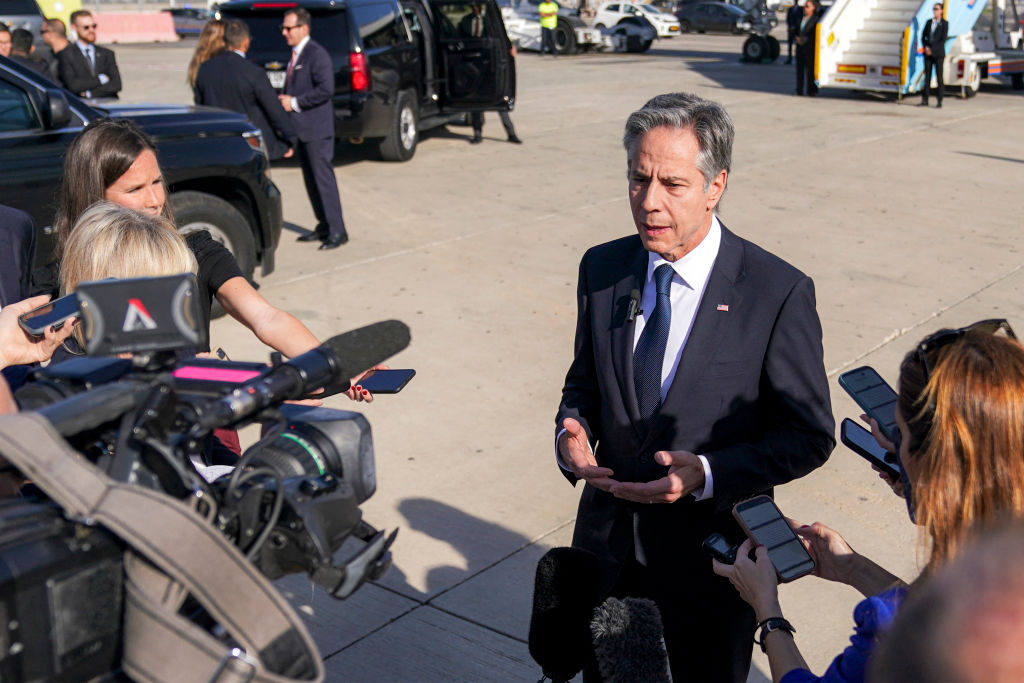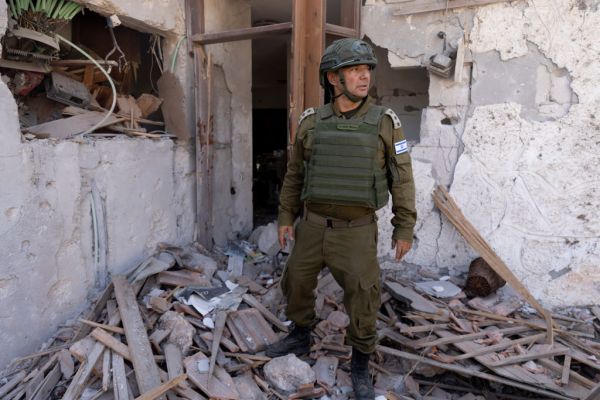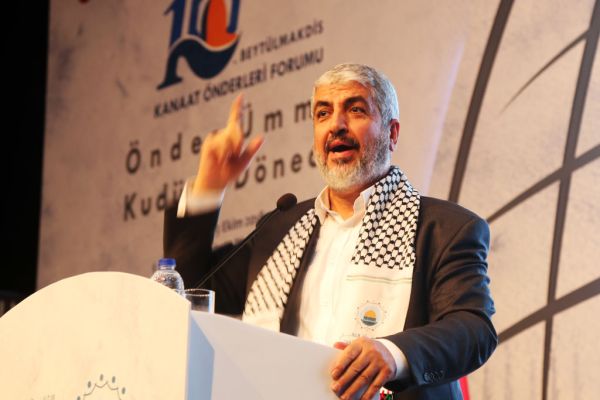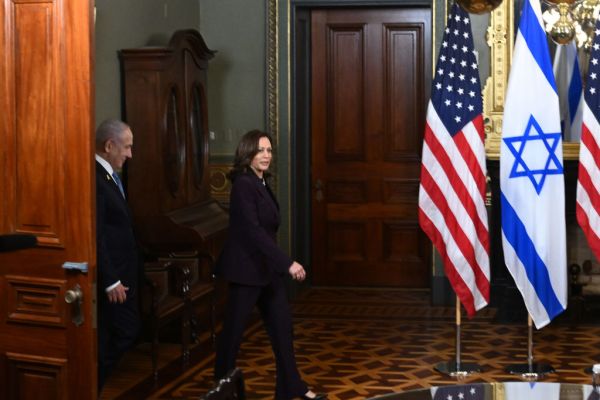Just over a year since the October 7 massacre triggered a deadly and ongoing conflict, Israel has achieved at least one of its war aims in Gaza: the decimation of Hamas as a military organization.
At least 17,000 of the terror group’s gunmen have died in the fighting, according to Israeli estimates, and its arsenals and avenues for re-arming have been all but destroyed. Targeted strikes have thinned out its ranks both in Gaza and elsewhere in the region, including top figures such as Ismail Haniyeh, Saleh al-Arouri, and Mohammed Deif. But last week marked Israel’s biggest achievement: the killing of Hamas leader Yahya Sinwar, the architect of October 7, by infantry soldiers in the southern city of Rafah.
But can Israel’s year of military victories pave the way for political change in Gaza? As the remnants of Hamas’ surviving leadership vow to continue fighting in Sinwar’s name, optimism in the U.S. that a wide-ranging deal might be possible following the death of the slain leader began to fade this week. Meanwhile, Israel’s operations to degrade Hezbollah in Lebanon are intensifying amid renewed strikes on Beirut as the region braces for Jerusalem’s anticipated retaliation against Iran for its October 7 ballistic missile attack.
Such is the Middle East that Secretary of State Antony Blinken arrived in this week, on the eve of a U.S. election and the precipice of a regional war.
America’s top diplomat met Tuesday in Israel with Prime Minister Benjamin Netanyahu and Defense Minister Yoav Gallant in a final push to reach a ceasefire-for-hostage release deal before the November 5 election. Such an agreement could allow the Biden-Harris administration to take credit for mediating the end to a politically sensitive conflict before Americans head to polling stations next month.
During his meeting with Netanyahu, Blinken “underscored the need to capitalize on Israel’s successful action to bring Yahya Sinwar to justice by securing the release of all hostages and ending the conflict in Gaza in a way that provides lasting security for Israelis and Palestinians alike,” according to a State Department readout.
After numerous failed attempts at brokering a deal to end the fighting and for the hostages’ return, U.S. officials hope taking Sinwar out of the equation will give them new room to maneuver for an agreement that makes way for regime change in Gaza. Upon the terror chief’s death, President Joe Biden described him as an “insurmountable obstacle” in achieving a better “day after” in the enclave. U.S. officials said Sinwar had refused to even participate in internationally mediated ceasefire negotiations in the weeks before his killing.
The decapitation of Hamas could also afford Israel more leeway in setting the terms for the end of the war. Gone is the fear the Sinwar will emerge from the rubble to claim victory over Israel by virtue of survival alone. With Hamas’ leader dead and its organized military structure effectively dismantled, Jerusalem has achieved one of the war aims it set a year ago.
As was the case during previous rounds of ceasefire negotiations, however, details matter. Although the U.S. and Israel have both signaled their support for the eventual deployment of a multinational force to take over administrative functions from Hamas in Gaza, Israeli officials remain determined to retain control of the Philadelphi Corridor. The 8-mile stretch of land between Egypt and Gaza has long been a key lifeline for Hamas, which for years used it as a smuggling route to transform the enclave into a fortified war machine ahead of the October 7 attack.
Israel also wants any future deal to recognize its right to operate in Gaza to conduct counter-terrorism operations—much as it does in the West Bank—and destroy military infrastructure as Hamas tries to reconstitute. The U.S. and other international intermediaries have pushed for a credible pathway to a Palestinian state as part of any agreement, but it remains a distant prospect amid Israeli opposition and fragmented Palestinian leadership.
“Israel is on the offensive. It has the momentum now on both fronts, in Gaza and Lebanon. I don’t think it’s going to want to stop things at the moment,” Chuck Freilich, Israel’s former deputy national security adviser, told The Dispatch. But Hamas may be equally reluctant to pursue diplomacy now, he added. “Hamas wants to hit back and show that they can keep fighting despite Sinwar’s killing. To signal that they’re willing to stop is to admit defeat, the failure basically of the whole effort. And that’s not their modus operandi.”
It’s also unclear, after a yearlong effort by Israel to degrade Hamas leadership, who’s left to negotiate with. In Gaza, Sinwar’s younger brother Mohammed is considered the likeliest contender to replace the slain leader. Abroad, a single figure like Khaled Meshal could emerge to lead Hamas’ political bureau from Qatar, but a multi-member council may instead assume leadership duties to prevent any one of them from being targeted by Israel—a strategy adopted by Hezbollah after Israel killed its replacement for Hassan Nasrallah following the terror chief’s assassination last month.
“Hamas fears that Israel will assassinate the new leader if they appoint one,” Yoni Ben-Menachem, an Israel-based Arab affairs expert, told The Dispatch. “But of course, this will not help them, because Israel will assassinate all the leadership—whether it’s one or whether it’s a few.”
Whoever takes over—whether an individual or group—will likely try to uphold Sinwar’s hardline approach to diplomatic overtures to end the war. In a speech following the leader’s death last week, Hamas political bureau member Khalil al-Hayya, another possible successor to Sinwar, said that the terrorist group would not change the slain leader’s conditions for a hostage deal—namely, a full Israeli withdrawal from the Gaza Strip before the release of abductees. “We will keep our oath to you Abu Ibrahim and your banner won’t fall,” al-Hayya said, using another name to refer to Sinwar.
“As far as Hamas is concerned, they’re sticking to the same positions of Yahya Sinwar before he was killed. If they make any concessions, this will be translated as yielding to Israel’s demands,” Ben-Menachem said. “They cannot afford such a thing, because it will look like a surrender in Gaza.”










Please note that we at The Dispatch hold ourselves, our work, and our commenters to a higher standard than other places on the internet. We welcome comments that foster genuine debate or discussion—including comments critical of us or our work—but responses that include ad hominem attacks on fellow Dispatch members or are intended to stoke fear and anger may be moderated.
With your membership, you only have the ability to comment on The Morning Dispatch articles. Consider upgrading to join the conversation everywhere.